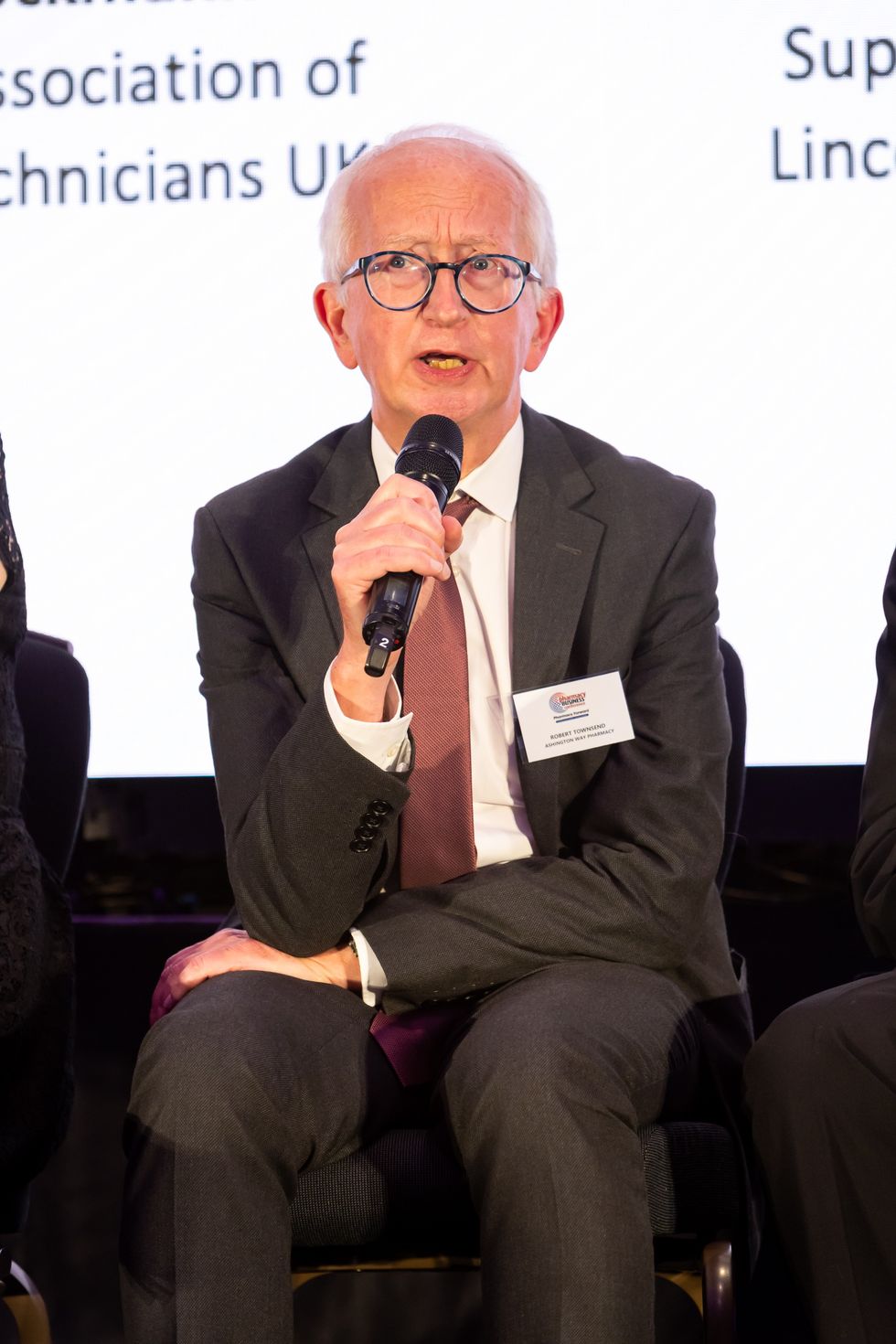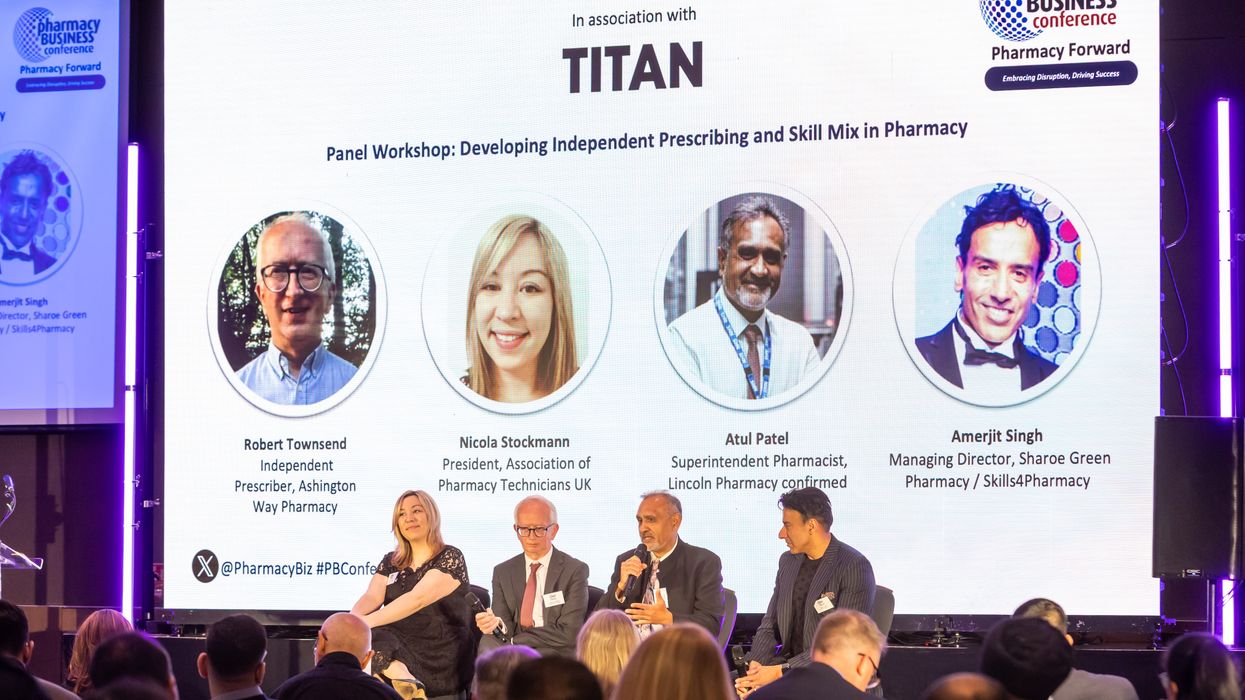“The workforce is your greatest asset,” said Nicola Stockmann, president of the Association of Pharmacy Technicians UK (APTUK).
Speaking at the recent Pharmacy Business Conference, she emphasised that investing in the entire pharmacy team, including pharmacy technicians and assistants, is essential for sustainable growth.
As one of the four panel members discussing the importance of developing independent prescribing and skill mix in pharmacy, Nicola highlighted the benefits of optimising team roles.
“By making sure the right person is doing the right thing at the right time, you can be more efficient with your services, and job satisfaction can improve across the whole team,” she said.
Nicole also stressed the need to create a conducive learning environment in pharmacies: “The pharmacy environment is where we learn, so it must be conducive to learning for everyone.”
Furthermore, Nicola said that developing independent prescribing (IP) requires collaboration from the entire team to remain agile.

Robert Townsend, independent prescriber at Ashington Way Pharmacy, and Atul Patel, superintendent pharmacist at Lincoln Pharmacy, echoed the importance of having a strong team to deliver services effectively.
“My team is vital to me, and I couldn’t do what I do without them,” Robert shared.
He explained how his team, including an Accuracy Checking Technician (ACT) and a trainee pharmacist, allows him to focus on patient care as an independent prescriber.
“We're moving towards enabling my two technicians to handle Pharmacy First consultations, which will allow me to concentrate on the patients who need my expertise,” he said.
Atul agreed, emphasising that having “a great team” has enabled them to offer and maximise a wide range of services, including travel vaccinations, COVID vaccinations, flu vaccinations, and stop-smoking support.
Atul believes in investing in both people and technology.
He said: "We have eight highly skilled apprentices, and we’ve invested in robotics and recently in Titan. Once everything works together, it’s going to be a game changer.”
“When we invested in technology, we didn’t reduce our staff; instead, we upsized and upskilled them.”
Independent Prescribing: progress and challenges
Atul’s pharmacy recently became an Independent Prescribing Pathfinder site, after a year of preparation. The day after going live, GP surgeries began sending out invitations to patients with uncontrolled hypertension, asthma, and mental health needs, and within one hour, all appointments were booked.
Atul held his first clinic the following day. “All patients turned up on time, were seen on time, and left very satisfied,” he shared.
However, the overwhelming demand raised concerns about sustainability.
Atul pointed out that while he managed by having one pharmacist handle the day-to-day work, and another (himself) run clinics, it’s not cost-effective without extra funding.
He suggested that scaling this model would require further investment for additional pharmacist support.
Atul reflected on an earlier experience where a clinic wanted to hire him full-time with government funding — making him question why similar investment wasn’t being made to fund pharmacists directly in their own community practices.
While pharmacists' independent prescribing is still not fully utilised, Atul acknowledged that the benefit of using them “in a proper and clinical way” has been recognised, and that “the journey is just starting.”
He also noted that the low uptake of independent prescribing is partly due to the lack of government investment in protected learning time for pharmacists.

Robert shared his independent prescribing journey, which began in 2007 — a revolutionary time when “the only medical prescribers were nurses, with just a few pharmacists working in hospitals.”
He was among four community pharmacists selected from Swindon for a pioneering NHS programme aimed at training community pharmacists to help alleviate pressure on GPs and urgent care.
He trained at Bath University and, despite feeling out of place among younger students, completed the course with strong NHS support.
Today, with 15 years of IP experience, Robert is part of a Pathfinder site and is helping to mentor and train other pharmacists.
Robert described his IP experience as a “fantastic success,” giving him “a major boost” to the second half of his career.
He takes pride in being known locally by patients for offering timely care and prescribing medicines they would otherwise wait a long time for.
Robert shared a case where he felt he had made a real difference as an independent prescriber.
“I had a young lady who had severe eczema and was quite desperate, and her GP appointment was a week away. I was able to prescribe Fucibet for her infected hands, prescribe mometasone for other affected parts, and supply some Epimax as a moisturising shower gel. I thought I made a difference there, and that's where I find real success in my role.”
However, Robert raised concerns about the future of the Pathfinder programme, noting that it might end soon due to funding uncertainties.
He warned that if the funding issue isn’t addressed, new pharmacists might leave community pharmacies for other opportunities where prescribing is better supported.

Takeaways
Atul urged attendees to “have a vision and take action to make it happen.”
He reflected on the significant technological advancements in pharmacy — from handwritten labels and typewriters to floppy disks, hard drives, and now web-based systems — but pointed out that two issues remain unchanged: the archaic remuneration system and the persistent lack of support for community pharmacies.
“Don't focus on problems, focus on solutions,” said Atul, stressing that focusing on solutions will lead to opportunities.
Nicola highlighted the importance of creating opportunities for the next generation.
“At APTUK, a key priority is making sure we don’t pull up the ladder up behind us,” she said.
“While it was difficult for us to get into our positions, we must make it easier for others. That is the true measure of progress.”
“Independent prescribing has become an integral part of pharmacy training, and accredited accuracy checking is now included in the initial education and training for pharmacy technicians - these are real measures of progress, from all of you, from all of us, to support the next generation.”
“So don't forget the impact your decisions have on the next generation,” Nicola urged.
Acknowledging that barriers still exist, she encourages pharmacy teams to focus on "what we can control" and to maintain a forward-looking mindset.

Amerjit Singh, managing director, Sharoe Green Pharmacy/ Skills4Pharmacy, who moderated the session, concluded by stressing the importance of empowering pharmacy staff to increase the adoption of independent prescribing.
“What pharmacy technicians and ACTs do in a hospital setting is very different from what they do in the community. We must empower our staff,” he said.













